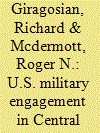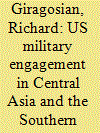|
|
|
Sort Order |
|
|
|
Items / Page
|
|
|
|
|
|
|
| Srl | Item |
| 1 |
ID:
135225


|
|
|
|
|
| Summary/Abstract |
There are signs that Moscow may now seek to halt Armenia’s deepening of ties with NATO and target Armenian reformers
|
|
|
|
|
|
|
|
|
|
|
|
|
|
|
|
| 2 |
ID:
050744


|
|
|
| 3 |
ID:
052087


|
|
|
|
|
| Publication |
March 2004.
|
| Summary/Abstract |
The regions of Central Asia and the Southern Caucasus have each acquired an elevated strategic importance in the new security paradigm of post-September 1lth. Comprised of five states, Kazakhstan, Kyrgyzstan, Tajikistan, Turkmenistan and Uzbekistan, Central Asia's newly enhanced strategic importance stems from several other factors, ranging from trans-national threats posed by Islamic extremism, drug production and trafficking, to the geopolitical threats inherent in the region's location as a crossroads between Russia, Southwest Asia and China. Although the U.S. military presence in the region began before September 11th, the region became an important platform for the projection of U.S. military power against the Taliban in neighboring Afghanistan.
Similarly, the Southern Caucasus, commonly referred to as the Transcaucasus, has long served as a key arena for competing regional powers. For much of the past two centuries, the Transcaucasus has been hostage to the competing interests of the dominant regional actors: Russia, Turkey and Iran. And this historical legacy is matched by the realities and vulnerabilities of the current security situation in the region. The three states of the Transcaucasus, Armenia, Azerbaijan, and Georgia, each face a difficult course of economic and political reform, systemic transition and nation building in a struggle to overcome the legacy of seven decades of Soviet rule.
These two strategic regions also play important roles as "security sentries" along the front line of a dynamic U.S. engagement in response to the emergence of new non-state security threats. But both regions also face more fundamental internal challenges, ranging from an overall deficit of democracy, and the related predominance of "strongmen over statesmen," to economic mismanagement and widespread corruption. These factors significantly impede the reform efforts of these states in transition, and seriously erode the still fragile security environment. It is this set of internal factors that presents the most daunting challenge, however, as the core fragility of these states cannot be effectively overcome simply through policies relying on enhancing their security or military capabilities.
|
|
|
|
|
|
|
|
|
|
|
|
|
|
|
|
|
|
|
|
|